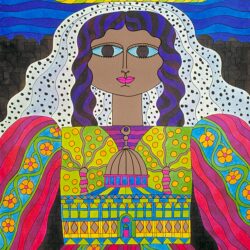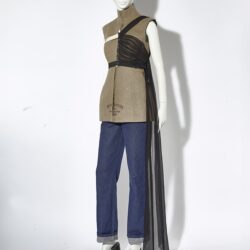Manage Your Terms with Opentheso

With the Dries Van Noten Study Center, MoMu brings together the activities of the museum's study collection and research projects all in one place. At MoMu, we believe that museums play an important role as pockets of innovation within the cultural and scientific fabric. Digitisation is an important driver of innovation. Last month, around 40 enthusiastic participants attended the Opentheso workshop at MoMu Auditorium. During this event, the management of thesauri in MoMu was explained.
Textile AGgregator
The workshop was part of the TAG project, a MoMu project subsidised by the Flemish Government. TAG, which stands for Textile AGgregator, aims to unify digital textile heritage and improve its quality as well as its accessibility.
Our textile past is omnipresent in Flemish museums. These museums manage rich and diverse collections, from machines and raw materials to finished products, from all centuries and corners of the world. In order to gain a clearer view of these different collections, better and integrated digital access is needed.
Within the scope of the TAG project, MoMu is working alongside 10 museums towards this disclosure. All participants have rich textile-related collections. They are also members of Network Textile Heritage Flanders, which is led by ETWIE, the Center for Industrial Heritage in Flanders (Belgium).
The project responds to the needs identified within this network, such as the coordination of collection policy. To this end, exchanging data on collections and sharing various authorities are important requirements. The workshop focused on the latter.

Opentheso
Sharing authorities is not only necessary for these network institutions. A well-managed terminology is extremely important to any institution with its own collection for efficient object registration. A high-quality thesaurus, with a well-built hierarchical structure, enriched with Linked Open Data concepts, is a useful instrument for registering and publishing a collection. The use of a customised tool to manage such terminology optimally is therefore no luxury. MoMu works with the open source tool Opentheso. The tool is web-based and is made available to the public free of charge.
Why did MoMu choose this tool? How do we use thesauri? What do we hope to achieve with it? These questions were addressed in the first theoretical part of the workshop. The emphasis was mainly on sharing our experiences. Practical examples highlighted the numerous advantages of the tool but also raised some critical concerns. One of the expected end results of the TAG project - a shared terminology around textile - was received with enthusiasm by the whole group.

Next, meemoo colleague Bert Lemmens placed MoMu's use case in a broader framework. He stressed the importance of concept-based working in a digital world that is increasingly committed to linked and open data management. However, he also warned that time and resources are needed for application set-up as well as good governance after roll-out to ensure sustainable thesaurus management.
In the hands-on part, participants were able to work on creating their own thesaurus. Together we went through the basic functionalities of the tool and participants were given the time to experiment on their own.
The workshop ended with a questionnaire among our participants about their work-related background, experience with thesauri and to what extent they would like to get started with the Opentheso tool. 'Yes' was the answer to this last question, but preferably with the necessary technical and/or content support ...


